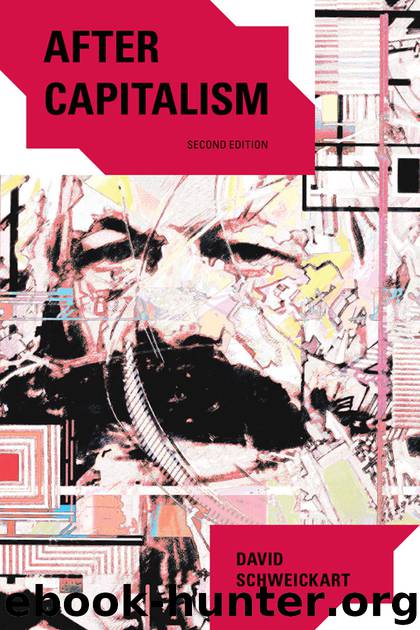After Capitalism by Schweickart David;

Author:Schweickart, David;
Language: eng
Format: epub
ISBN: 781776
Publisher: Rowman & Littlefield Publishers
4.5.1 Poverty in Rich Countries
Damage to the human spirit is particularly acute in a rich society that has removed the legal barriers to equality. The message in such societies: If you don’t make it, it’s your own fault. Poverty becomes unbearable. It destroys self-respect. Is it any wonder that if you are poor and without prospects, you join a gang and wreak havoc? Is it any wonder that you seek relief in alcohol, crack, meth, or some other chemical that gives a thrill and dulls the pain? Is it any wonder that you are tempted to deal the poison—your only chance, however slim, at the (false) happiness of big money? Sure, you’ll likely go to prison, but so what? Inside is not so very different from outside. (The United States, during the past four decades, has seen its prison population nearly quintuple. With less than 5 percent of the world’s population, the United States now contains an astonishing 25 percent of the world’s prisoners, some 2.3 million adults—with another 7.3 million on probation.24)
The only real cure for the material and spiritual ravages of poverty is decent work. We all know that. Liberal and social-democratic welfare measures can never really solve the problem, and they sometimes make it worse—as conservatives delight in pointing out. Human beings need to work. Work—good work—gives structure and meaning to your life. As a living human being, you consume, or else you would cease to be a living being. But if you consume, other people have worked for you. Self-respect demands that you contribute something in return.
But a normal psyche can bear only so much shame and guilt, so defensive mechanisms kick in: self-deception, cynicism, a hardening of the heart, a brazen disregard for basic principles of human decency. Without the pride and self-discipline that good work instills, the human spirit shrivels.25
Capitalism cannot provide work for all—work, period, let alone good work. Unemployment is essential to a healthy capitalism. A healthy capitalism requires not only poor people but poverty, a painful, degrading, shameful condition that people will strive mightily to avoid. How else can employers keep those workers in line? You can beat slaves or serfs but not “free” men and women. (There was a time when we dreamed of eliminating poverty in the United States. Back in the heyday of Keynesian liberalism, when “full employment” was taken seriously as an achievable goal, President Johnson declared a “War on Poverty,” in his words, “a total commitment by this President, this Congress and this nation to pursue victory over the most ancient of mankind’s enemies.”26 No mainstream thinker or politician would propose such a thing today. All know it is impossible—though none will point to capitalism as the insurmountable obstacle.)
A full-employment policy, which would eliminate domestic poverty, can be implemented under Economic Democracy, and will be. It doesn’t follow that such a policy will be easy to design and carry out, particularly during the transition. Capitalism will have left a lot of human wreckage in its wake.
Download
This site does not store any files on its server. We only index and link to content provided by other sites. Please contact the content providers to delete copyright contents if any and email us, we'll remove relevant links or contents immediately.
| Anarchism | Communism & Socialism |
| Conservatism & Liberalism | Democracy |
| Fascism | Libertarianism |
| Nationalism | Radicalism |
| Utopian |
The Secret History by Donna Tartt(16607)
The Social Justice Warrior Handbook by Lisa De Pasquale(11485)
Thirteen Reasons Why by Jay Asher(7782)
This Is How You Lose Her by Junot Diaz(5753)
Weapons of Math Destruction by Cathy O'Neil(5029)
Zero to One by Peter Thiel(4816)
The Myth of the Strong Leader by Archie Brown(4785)
Promise Me, Dad by Joe Biden(4440)
Stone's Rules by Roger Stone(4412)
Beartown by Fredrik Backman(4403)
How Democracies Die by Steven Levitsky & Daniel Ziblatt(4392)
The Fire Next Time by James Baldwin(4336)
100 Deadly Skills by Clint Emerson(4070)
A Higher Loyalty: Truth, Lies, and Leadership by James Comey(4024)
Rise and Kill First by Ronen Bergman(4008)
The David Icke Guide to the Global Conspiracy (and how to end it) by David Icke(3875)
The Farm by Tom Rob Smith(3869)
Secrecy World by Jake Bernstein(3773)
The Doomsday Machine by Daniel Ellsberg(3725)
